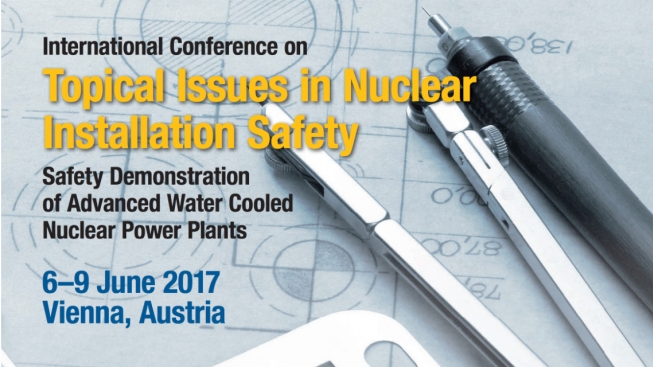IAEA Conference Addresses Key Issues in Nuclear Installation Safety

Increased use of big data could lead to enhanced safety at nuclear installations, heard attendees at the opening of an IAEA International Conference on Topical Issues in Nuclear Installation Safety in Vienna today.
Thirty countries are using nuclear power for their energy supply, while about thirty others are considering introducing it, or have begun preparations. The conference brings together industry professionals, scientists, senior regulators, technical experts and operators to share experiences on challenges in demonstrating safety at nuclear power plants.
“Nuclear installation safety is of global importance as nuclear accidents can have effects across borders,” IAEA Director General Yukiya Amano said in his opening remarks. “This makes licensing and supervision of nuclear power plants a concern not only for operating nations, but also for countries near and far.”
Smarter way of improving nuclear safety
Demonstrating nuclear installation safety is becoming more complex due to new technologies and updated safety requirements, said Petteri Tiippana, Director General of the Finnish Radiation and Nuclear Safety Authority and President of the conference. “We need to make sure safety standards are applied, and to identify both good practices and areas of improvement in conducting safety demonstrations.”
With the ever-increasing digitalization of many aspects of people’s daily lives, the nuclear industry is also considering the use of novel measures to enhance operational performance of nuclear installations, Tiippana said. “The industry has started exploring the possibility of using big data to enhance the reliability and safety of nuclear installations. The nuclear community has been very good at collecting data, and if we look into the possibilities and challenges, we might be able to discover nuanced approaches in the engineering and operations of nuclear power plants to make them safer in a way we could not imagine before.”
Throughout the week, 320 participants from 48 countries and five international organisations will discuss topics such as safety assessment and licensing of advanced reactor designs, design safety principles and safety reinforcement of existing installations. There will be a particular focus on nuclear power plants using water cooled reactors, including small and medium sized or modular reactors. The implications of the Vienna Declaration on Nuclear Safety for operating nuclear power plants will also be discussed.
IAEA safety standards
The IAEA has established safety standards that serve as a global reference for protecting people and the environment. It has revised requirements on safety assessment and design safety and a revision of associated safety guides is underway. “I encourage all countries to make full use of the many services offered by the IAEA in nuclear safety,” Mr Amano said.
The conference is expected to provide recommendations for future IAEA activities in the areas of nuclear installation safety and for strengthening international cooperation. It is one of a series of international conferences on nuclear safety which the IAEA has organized since 1998.
Thirty countries are using nuclear power for their energy supply, while about thirty others are considering introducing it, or have begun preparations. The conference brings together industry professionals, scientists, senior regulators, technical experts and operators to share experiences on challenges in demonstrating safety at nuclear power plants.
“Nuclear installation safety is of global importance as nuclear accidents can have effects across borders,” IAEA Director General Yukiya Amano said in his opening remarks. “This makes licensing and supervision of nuclear power plants a concern not only for operating nations, but also for countries near and far.”
Smarter way of improving nuclear safety
Demonstrating nuclear installation safety is becoming more complex due to new technologies and updated safety requirements, said Petteri Tiippana, Director General of the Finnish Radiation and Nuclear Safety Authority and President of the conference. “We need to make sure safety standards are applied, and to identify both good practices and areas of improvement in conducting safety demonstrations.”
With the ever-increasing digitalization of many aspects of people’s daily lives, the nuclear industry is also considering the use of novel measures to enhance operational performance of nuclear installations, Tiippana said. “The industry has started exploring the possibility of using big data to enhance the reliability and safety of nuclear installations. The nuclear community has been very good at collecting data, and if we look into the possibilities and challenges, we might be able to discover nuanced approaches in the engineering and operations of nuclear power plants to make them safer in a way we could not imagine before.”
Throughout the week, 320 participants from 48 countries and five international organisations will discuss topics such as safety assessment and licensing of advanced reactor designs, design safety principles and safety reinforcement of existing installations. There will be a particular focus on nuclear power plants using water cooled reactors, including small and medium sized or modular reactors. The implications of the Vienna Declaration on Nuclear Safety for operating nuclear power plants will also be discussed.
IAEA safety standards
The IAEA has established safety standards that serve as a global reference for protecting people and the environment. It has revised requirements on safety assessment and design safety and a revision of associated safety guides is underway. “I encourage all countries to make full use of the many services offered by the IAEA in nuclear safety,” Mr Amano said.
The conference is expected to provide recommendations for future IAEA activities in the areas of nuclear installation safety and for strengthening international cooperation. It is one of a series of international conferences on nuclear safety which the IAEA has organized since 1998.

Speakers
and participants at the opening session of the 2017 International
Conference on Topical Issues in Nuclear Installation Safety. (Photo: A.
Evrensel/IAEA)

No comments:
Post a Comment